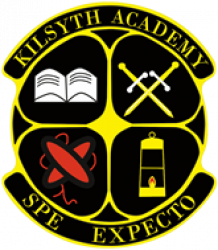S1 Science
In first year all learners will follow a general science course in which they will have lessons in Chemistry, Physics and Biology. These sciences will be embedded in topic areas.
The learning in science in S1 builds on the science experienced in Primary.
The Topic areas in First Year are:
Introduction unit – apparatus, safety, recording observations from experiments.
Matter – solids, liquids and gases, and particles
Light – The Physics of light such as refraction, reflection and colour.
Heat – The Physics of heat moves through substances.
Astrobiology – The Physics and Biology of the solar system and the conditions for life.
Awesome acids – Chemistry, looking at the pH of substances.
Cells – The Biology – The structure of cells, reproduction in animals, organ systems, the use of technology to measure heart rate etc and relate this to health.
Photosynthesis – The need for plants to make food and their role.All units show how science affects us in our everyday life.
Scientist of the Month
Learners in S1 are also required to carry out research at home in what is called a “Scientist of the Month” project. The topic areas are:
- A Scottish Scientist. (homework piece)
- Advice leaflet on how to prevent heat loss from your home.(homework piece)
- Advice leaflet for pregnant women on how to ensure the birth of a healthy child.(homework piece)
- Designing and building a moon rover for collecting samples to test.
- How acids and alkalis are used in everyday life.
The best work is rewarded with a certificate in a ‘celebration of success’ event. The names are also posted on the Science Department celebration of Success notice board.
Homework
Scientist of the Month projects as detailed above.
All learners will have a piece of written homework at least once a week.
They are also expected to look at the notes in their jotters before they attend their next lesson.
Sometimes the homework will take the form of learning a piece of information
If they are absent they will need to catch up on what they have missed.
Literacy and Numeracy
Literacy is developed throughout S1 in many ways:
Focusing on their ability to carry out research and produce a piece of writing.
This in itself requires many skills such as accessing and collecting relevant information, writing in their own words and in a logical order to allow others to understand. they need to use appropriate scientific language.
Reading a passage and answering questions to show understanding.
Punctuation, grammar and spelling.
Numeracy and investigative skills are developed throughout S1 in many ways:
Drawing bar charts to present information which has been given in the form of a table.
Drawing line graphs from information which has been given in the form of a table.
Interpreting the information from both bar charts and line graphs and writing a conclusion.
Collecting information and presenting it in the form of a table with suitable headings.
Planning an investigation, collecting data, presenting the data as a table, graph or other format, and writing a conclusion and evaluate their method.
Assessment in S1
There are end of topic assessments in which there are questions for knowledge and skills in problem solving/numeracy.
Report writing/numeracy – on going through S1
Research/literacy – ongoing through S1
Learners are expected to prepare for end of topic assessments, and to do their best at all times.


